Subhash Arya is a post-doctoral fellow at the University of Michigan, Ann Arbor. Arya’s fascination with neutrophils drives his current research, which aims to understand how neutrophils initiate inflammatory responses.
Neutrophils are the most abundant cells in the body, but despite the advancement of drugs and vaccines, research has mainly focused on their role in adaptive immune responses. However, as researchers conduct more studies, they are discovering how neutrophils also control inflammatory responses. Subhash Arya believes that this research could eventually help in understanding chronic inflammatory diseases such as rheumatoid arthritis, atherosclerosis, and asthma, providing potential therapeutic targets for these disorders.
Arya explains that people have long viewed neutrophils as the “bad guys” of the immune system. This is because of their role in causing strong inflammatory responses. Surprisingly, his research has found that neutrophils not only initiate inflammation but also play a crucial role in resolving it. Specifically, neutrophils communicate with other cells, like macrophages, to clear debris created during injury or infection. Without neutrophils signaling to macrophages, inflammation would persist. This is why Arya is re-thinking neutrophils as the “good guys” in inflammation.
Transition to immunology
Initially trained as a cell biologist, Subhash Arya’s research has expanded into immunology. Last year, he attended his first AAI Annual Meeting, which he describes as “both enlightening and informative”. This experience prompted him to consider a career shift toward immunology. The collaborative environment at the conference exposed him to researchers with different expertise who were working with similar cell types and asking similar questions.
Arya’s advice to those looking to move into immunology: “be prepared for the vastness of the field”. Immunology spans from innate immune responses, including mucosal cells, to adaptive responses and vaccines. There are many areas to explore. Aspiring researchers should master the latest technological tools, such as spatial transcriptomics and multi-spectral flow cytometry, to simplify answering research questions.
At the AAI Annual Meeting, there has been a great effort to include trainees in major symposia and talks, and Arya hopes to see more of this in the future. Trainees play a significant role in scientific research, and he believes they should be given more opportunities to contribute and speak at conferences like the AAI Annual Meeting.




